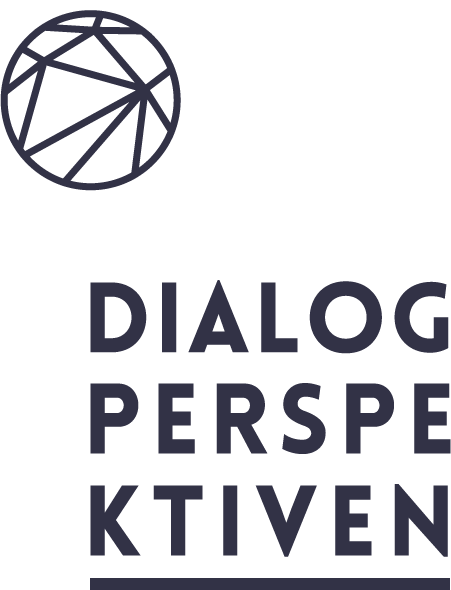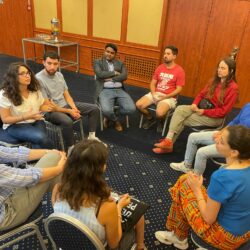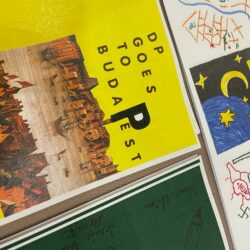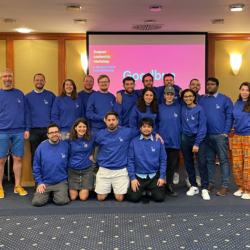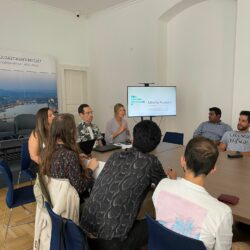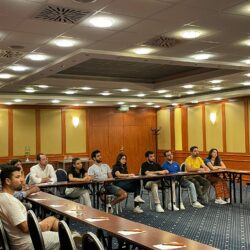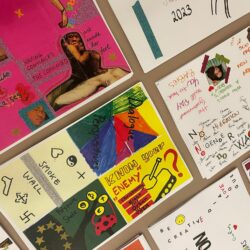Rückblick: European Leadership Workshop
"Know your enemy: the entanglements between right-wing agents and religion in Europe.", 4.-7. September 2023, Budapest, Ungarn.
Vom 4. bis 7. September 2023 nahmen 20 Teilnehmer*innen aus 12 europäischen Ländern und mit unterschiedlichen religiösen und weltanschaulichen Hintergünden am European Leadership Workshop 2023 in Budapest, Ungarn, teil. Unter dem Titel „Know your enemy: the entanglements between right-wing agents and religion in Europe“, lernten die Teilnehmenden Strategien und Methoden, um rechte Diskurse zu analysieren und in Hinblick auf Religion und Weltanschauungen einzuordnen.
Der Workshop brachte europäische Expert*innen aus den Bereichen Wissenschaft, Journalismus und Aktivismus zusammen, die tiefe Einblicke in rechtes Denken und rechte Rhetorik im europäischen Kontext gaben. In den einzelnen Sitzungen lernten die Teilnehmer eine Vielzahl von Fällen kennen, in denen rechte Narrative in geschlechterfeindliche, anti-egalitäre, anti-liberale und antisemitische Diskurse und Strategien eingebettet sind, wobei die Instrumentalisierung der christlichen Religion durch dieselben rechten Akteur*innen in Europa hervorgehoben wurde.
Introduction into the European and Hungarian political landscape
Kicking of the event, on 4 September, programme Director Johanna Korneli and Programme Manager Neta-Paulina Wagner welcomed the participants and highlighted the importance of the workshop in the light of the recent shift within the European political landscape, in particular the rise of the so-called ‘new right’ in throughout the European Union.
In his opening lecture, entitled „How did we get here? Why do we need to know ‚the enemy‘?“ Henri Vogel, researcher in the field of Religious Studies and trans-rights activist used Hungarian Prime Minister Viktor Orbán’s 12 points for the Conservative Political Action Conference as a case study. Using three key questions, he led participants in dissecting Orbán’s speech, uncovering its talking points, rhetorical strategies and hegemonic discourse techniques. This sparked dynamic discussions that deepened our understanding of the workshop’s core theme, especially in the Hungarian context. Participants also contributed their own examples of right-wing narratives from their home countries, strengthening both camaraderie and knowledge sharing. As a result, everyone left with valuable insights into Hungary’s contemporary political and cultural landscape.
Anti-gender-narratives, conspiracy theories and possible responses
The second day of the workshop began with a session led by Prof. Dr. Andrea Pető, entitled “Know your enemy: Gender and Beyond“. Andrea Pető is a Hungarian historian and professor of Gender Studies at Central European University. In her session she delved into the Hungarian paradigm of anti-gender policies, showing how gender issues are manipulated to create antagonistic fractions fuelled by hatred, while hollowing out understanding of terms such as ‘human rights’. She further explored her theory of Hungary’s illiberal ‘polypore’ state and its relationship with European funding channels that support this state by recognising existential threats to gender equality, open society principles and minority rights.
Gionathan lo Mascolo, a researcher focusing on the connectivity of religion, extremism, and far-right politics in Europe,then took the stage with his session ‚The Christian Right in Europe‘. He shed light on how the European Christian Right draws inspiration from the successes of the US Christian Right and the global far right, particularly in its anti-gender and anti-Muslim narratives. Mascolo then led a group discussion in which participants considered the question „How should we respond to the emergence of the Christian Right in Europe?“ from four different perspectives: left-wing, conservative, religious and civil society.
Tom Lantos Institute and House of Terror
On Tuesday afternoon, a meeting was held with the Tom Lantos Institute, an independent organisation dedicated to human and minority rights, with a particular focus on Jewish and Roma communities, as well as various ethnic, linguistic and religious minorities. The Institute serves as a valuable research and education platform, bridging the gap between research and policy and addressing a wide range of issues. During our meeting the participants gained insights into the processes and opportunities of having minority voices heard at an UN level as well as the Institute’s programmes, publications and its role both within Hungary and on the international stage.
Later in the afternoon, participants visited the House of Terror, a museum in Budapest established during the early years of Viktor Orbán’s government (1998-2002) that focuses on the history of state terror during both the fascist (1944-1945) and communist (1945-1956/1957-1989) regimes in Hungary. This museum, whose target audience is Hungarian citizens, has been widely criticised for rewriting history in order to manipulate the national consciousness into a victim-survivor narrative. The visit allowed participants to explore the (lack of) nuances of Hungarian memory politics and political memory.
Historical narratives and current networks
On the third day of the Henri Vogel returned with a lecture entitled “Nationalism and Christianity in Hungary“. The speaker skilfully juxtaposed Hungary’s historical narratives, highlighting the stark contrast between past and present in terms of the culture of victimhood adopted by the Hungarian state. This narrative shift has been strategically used to promote the concept of „national salvation“ within the sacred framework of the „chosen nation“. Henri Vogel further explored the constitutional model of „Orban’s Re-Christianisation of Hungary“, in which Christian nationalism emerged as a newly fashioned political tool in the face of rising secularisation trends, with far-reaching implications for both secularisation and anti-migrant attitudes.
Later in the afternoon, Natasha Strobl, an Austrian political scientist renowned for her expertise on right-wing extremism and the New Right, spoke on shared identity within the European alt-right movement, exploring the theme „Who is Who: Networks of the European Alt-Right?“ She focused her talk on ‚white fears‘, the ‚Great Replacement‘ conspiracy theory and the anti-refugee campaigns of 2015-16, drawing a link to stochastic terrorism by far-right actors. Strobl stressed that what’s unfolding can be likened to an intellectual battlefield, involving various media such as memes, videos, images, cultural clashes, victim-hero dynamics, and a confrontation between what right-wing actors call the ‚woke movement‘ and the ‚conservative movement‘. In particular, she highlighted that European alt-right networks are essentially transnational entities, disseminating identical content across different EU countries, with language proving no barrier to the spread of disinformation.
Reflection in different modes
Later, participants had the opportunity to put their newfound insights and editing skills to use in creating their own zines, guided by artist Nina Prader’s expertise in „The Application of Zines as a Cultural Technique.“ Prader provided a concise history of zines, highlighting their role in cultural production as a means to visually express ideas about politics, art, music, subcultures, and fashion. She emphasized how zines have evolved with the socio-cultural context of each era, dating back to the invention of the printing press. This hands-on session served as a creative laboratory, fostering idea exchange and discussions during the zine editing process.
On the workshop’s final day, participants engaged in group discussions based on the themes presented by the speakers. These lively conversations allowed attendees to reflect on the workshop and share their perspectives on the various sessions. In the closing session, participants continued to exchange insights, express their final thoughts on the workshop discussions, and underscored the significance of European civil society and events like the European Leadership Workshop in preserving pluralism and democracy rooted in principles of solidarity and liberalism.
Text: Ioannis Stylianidis, Neta-Paulina Wagner
